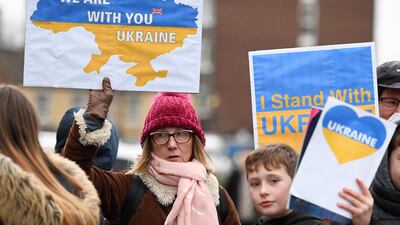Live updates: follow the latest news on Russia-Ukraine
An online backlash over the perceived relativism and racist undertones of reactions to the war in Ukraine is brewing on social media.
Thousands of people from Arab countries and Afghanistan are posting pictures of themselves in everyday situations on Twitter and Instagram, using the hashtags #civilised and #uncivilised.
Ukraine's appeal for survival posits on it being a European democracy. President Volodymyr Zelenskyy told a European audience that this was a reason to rally to its defence. “We have proven that at a minimum, we are exactly the same as you,” he said.
Some commentators have suggested attacks on Ukraine were unlike attacks taking place in other conflict zones such as Syria.
“So, the question is, is the West going to tolerate the Russians doing this to Ukraine?” asked Philip Breedlove, a retired US general.
“What if the Russians do what they did in eastern Syria and they drop barrel bombs and make rubble of cities and terrorise citizens and force them on the road and make them refugees across Europe?”
Some of the language used has been disturbing to them, and hurtful.
“These are not the refugees we are used to … these people are Europeans,” Bulgarian Prime Minister Kiril Petkov said of the Ukrainians this week. “These people are intelligent, they are educated people. This is not the refugee wave we have been used to, people we were not sure about their identity, people with unclear pasts, who could have been even terrorists…”
Reporting from Ukraine’s capital at the start of the Russian invasion, a CBS correspondent said Kyiv “isn’t a place, with all due respect, like Iraq or Afghanistan that has seen conflict raging for decades. This is a relatively civilised and relatively European city … where you wouldn’t expect that to happen”.
Some Arabs and Afghans said the insinuation was that they are “uncivilised” and that their lives have less value.
After an initial wave of criticism, thousands are now mocking the journalist’s comments by posting pictures of themselves at work, home or in social settings and referencing his words.
“Me, an #uncivilized #refugee from #Palestine, physician and researcher saving #civilised lives of critically ill patients and producing scientific research for fighting #Covid_19,” Palestinian doctor Osaid Asser posted, with a picture of himself in scrubs. Dr Asser said he was a graduate of the universities of Oxford and Harvard.
“Hi it’s me Arash from uncivilised Afghanistan, logging on from a mostly civilised Los Angeles,” another user posted.
Iranian Twitter has also picked up the charge, with users voicing their disappointment in the commentary with the hashtag #euracism in Farsi.
The reporter’s comments also drew condemnation from fellow journalists for their insensitivity.
The Arab and Middle Eastern Journalists' Association called out the media coverage of Ukraine more generally, saying it was “orientalist and racist”.
It said the way in which journalists had compared the crisis with conflict in the Middle East “ascribes more importance to some victims of war over others”.
Chris Doyle, of the Council of British Arab Understanding, told The National that some of the commentary highlighted the ignorance and casual racism towards the region.
“Many people would have thought attitudes like that would have died, but sadly that isn’t the case. The Middle East is literally the cradle of civilisation.
“To suggest otherwise is completely wrong.”
Mr Doyle said that the attitude of European countries towards refugees from Ukraine and the sanctions imposed on Russia “exposed double standards”.
“People are being encouraged to fight in Ukraine or celebrated for using Molotov cocktails and called ‘freedom fighters’, and then in other parts of the world like Iraq or the West Bank, they are called ‘terrorists’.
“Europeans are showing extraordinary empathy with Ukraine and Ukrainians, which is excellent, but people from other countries that have been blighted by war are looking at this and asking: ‘Where was the empathy when it was us?’”


